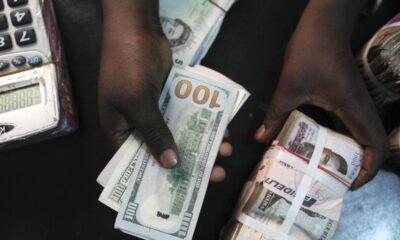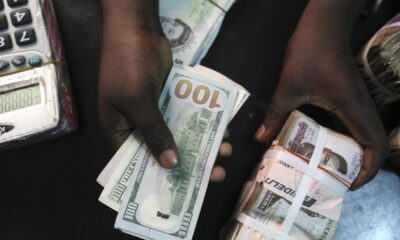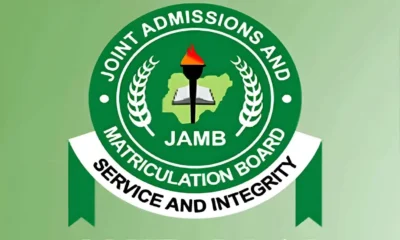BUSINESS
World Bank Blacklists 58 Nigerian Firms, Individuals – [See Details]
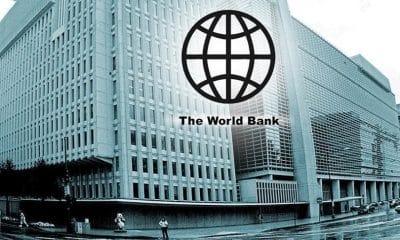
The World Bank has taken action against no fewer than 58 Nigerian companies and individuals for their alleged involvement in corrupt practices.
World wide gist understands that the strict action is part of the financial institution’s ongoing commitment to maintaining integrity and transparency in its projects and operations.
Reports revealed that out of the affected entities, 39 Nigerian companies were already blacklisted by the African Development Bank (AfDB), while 19 individuals were identified by the World Bank under the cross-debarment policy.
As a result, the total number of debarments has now reached 58, making these entities ineligible to participate in projects and operations funded by the World Bank Group.
The World Bank regularly updates the list, which currently includes a total of 1,210 companies and individuals worldwide.
It is worth noting that debarment prevents these firms and individuals from engaging in projects and operations financed by the World Bank Group.
According to the World Bank report, the sanctions were imposed after an administrative process conducted by the Bank. This process allowed the accused firms and individuals to respond to the allegations, following the Bank’s procedures for sanctions proceedings and settlements in bank-financed projects.
“Through July 2007, this process was conducted in accordance with the Sanctions Committee Procedures adopted on August 2, 2001. The process is currently conducted in accordance with Bank Procedure: Sanctions Proceedings and Settlements in Bank-Financed Projects. For more information on the two-tier sanctions process, goes to Sanctions,” the World Bank stated in its latest publication.
It is worth noting that cross-debarment, in line with the Agreement for Mutual Enforcement of Debarment Decisions dated 9 April 2010, has been implemented by the World Bank, Asian Development Bank, European Bank for Reconstruction and Development, Inter-American Development Bank, and African Development Bank.
Furthermore, in addition to debarment, the Bank retains the authority to impose other measures on entities and individuals found to be in breach of its policies, which may not always lead to debarment.
The misconduct that can result in debarment is outlined in the relevant Procurement or Consultant Guidelines, as well as in the World Bank Procurement Regulations for Investment Project Financing Borrowers. These guidelines may differ based on the specific project at hand.
The World Bank’s actions demonstrate its dedication to fighting corruption and upholding transparency in development initiatives, ensuring that resources are utilized efficiently for the betterment of society.
BUSINESS
Tinubu Govt Allocates ₦20 Trillion Pension Funds To Infrastructure Investments
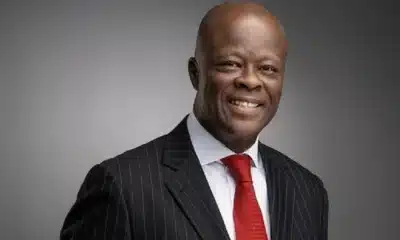
The federal government aims to boost economic growth by utilising ₦20 trillion from the nation’s pension funds to finance vital infrastructure projects nationwide.
Finance Minister and coordinating minister of the economy, Wale Edun, disclosed this to State House correspondents after President Bola Tinubu presided over the Federal Executive Council meeting at the Presidential Villa.
He mentioned that the initiative is a crucial part of Tinubu’s comprehensive reforms aimed at stabilising the economy in the face of high inflation and interest rates.
He stated that the government will work closely with private sector players to access the over ₦20 trillion pool of long-term funds available with Nigeria’s pension, life insurance, and investment funds.
Edun said “And one of the key drivers of economic growth is investment in infrastructure, in housing, power, rail, roads, water transport, even technology.
“These are key drivers of economic growth, they increase productivity when you invest in them, you get increased productivity, you get economic growth, and you get job creation, which reduces poverty.
“And that is the strategy, so it’s two-pronged, and we’re not pivoting towards this all-important growth, and you say where were the resources come from? Nigeria is resilient; Nigerians are resilient.
“And the fact is that even before we start looking to foreign investors, we start looking to foreign funding available in Nigeria, long-term funds to fund infrastructure projects, and it’s within the pension.
“The life insurance and investment fund industry. Generally, there are offers of 20 trillion Naira available, or much of it is in short-term funding that doesn’t need to be quite sure money is long-term. People save over their lifetime for their pension.
“And so in conversation, in consultation, collaboration and cooperation with the private sector, we are now able to announce and with the full knowledge and support of all parties, that there will be an initiative to fund growth through investment in infrastructure, including housing provision of mortgages, long term mortgages, 25 year mortgages at relatively low interest rates.
“Initially, of course, the government will standby and provide some support, particularly in this era of high interest rates, but eventually, as interest rates come down, there should be less room for the government through providing, for example, guarantees and so forth.“
The Finance Minister exuded confidence, stating, “The best minds have committed to realise this ambitious vision that leverages our own resources to build a prosperous future.“
Tinubu committed to pensioners’ welfare, says Finance Minister
Minister of Finance and Coordinating Minister of the Economy, Wale Edun, has said President Bola Ahmed Tinubu is committed to the welfare of vulnerable Nigerians, particularly pensioners.
He made the statement during a visit to the Pension Transitional Arrangement Directorate (PTAD) headquarters in Abuja.
The minister engaged with PTAD’s management and staff, then toured the premises to familiarise himself with the operations of each department and unit.
He said that despite the inflation, Tinubu prioritises the welfare of pensioners because it is in line with his Renewed Hope Agenda.
Edun promised to assist the Directorate in processing the new pension increment, arrears, gratuities, and entitlements for Next-of-Kins (NoKs) and praised the Directorate for their valuable work.
The Executive Secretary of PTAD, Dr. Chioma Ejikeme, emphasised the agency’s dedication to providing excellent services to pensioners and other stakeholders in accordance with the Directorate’s mandate.
BUSINESS
Shell Fire Incident Sparks Concerns Of Gas Price Surge In Nigeria

The fire that occurred on Tuesday at Shell’s Gbaran facility in Bayelsa might lead to an increase in the price of Liquefied Natural Gas in Nigeria.
This comes amidst a sharp increase in the country’s Liquefied Petroleum gas prices.
One of the facilities crucial to Nigeria’s LNG gas feedstock project, processing nearly 2 billion standard cubic feet of gas daily, Shell’s Gbaran facility, was rocked by an explosion on Tuesday.
Shell reassured that despite the incident, there would be no immediate operational shutdown of the facility.
Meanwhile, the company announced on Tuesday its plans to investigate the incident’s details and assess any potential impacts on its operations.
“We are actively monitoring reports of smoke detected near our Gbaran Central Processing Facility in Bayelsa State.
“While the source appears to be external to our facility, we are in close communication with regulatory authorities to look into the incident and ensure the safety of the surrounding communities,” it said.
The annual increase in the price of a 12.5-kilogram cylinder of Liquefied Petroleum Gas, also known as cooking gas, is 46.88 percent.
The price of LPG has remained high despite the federal government’s VAT waivers for product imports since last year.
Nigeria depends on imported LPG to fulfill 50% of its consumption.
BUSINESS
Naira Appreciates Against Dollar After Weeks Of Decline

The Naira has recorded its first N61.38 appreciation against the Dollar at the official foreign exchange market after weeks of depreciation.
Recall that Bureau De Change operators blamed the Naira’s depreciation on the Central Bank of Nigeria’s insufficient foreign currency allocation.
However, FMDQ data showed that Naira appreciated by N1459.02 per Dollar on Wednesday compared to N1520.40 on Tuesday.
This represents a 4.2 per cent gain against the Dollar on Wednesday compared to the previous day.
Similarly, the Naira dropped to N1515 per Dollar in the parallel market section from N1520.
This development comes amid a report by the Nigeria Bureau of Statistics (NBS) showing that Nigeria’s inflation surged to 33.69 percent in April 2024.
EFCC Vows To Clampdown On Businesses, Others Charging In Dollars
Meanwhile, the Economic and Financial Crimes Commission (EFCC) has intensified its efforts against illegal dollar transactions in Nigeria, warning businesses and individuals against illegal dealing in foreign currency.
Naija News reports that the Acting Director of Public Affairs for the EFCC, Wilson Uwujaren, made this disclosure while speaking on Channels Television’s program, Politics Today.
He emphasized the agency’s commitment to enforcing the law strictly.
Uwujaren declared, “The ship has already left the train station. We have started a movement, and we are not going to relent.”
He urged the public to cooperate with the EFCC by reporting any suspicious activity.

 GIST9 months ago
GIST9 months agoPolice confirm abduction of 10 persons in Jalingo, Taraba State capital

 BUSINESS9 months ago
BUSINESS9 months agoBlack Market Dollar To Naira Exchange Rate Today 5th January 2024

 BUSINESS9 months ago
BUSINESS9 months agoBlack Market Dollar To Naira Exchange Rate Today 6th January 2024

 GIST9 months ago
GIST9 months agoBoko Haram kills 5 in Yobe

 EDUCATION9 months ago
EDUCATION9 months agoJAMB Announces 2024 UTME/DE Registration Dates, Increases Fees

 EDUCATION9 months ago
EDUCATION9 months agoVisa Ban: UK Varsities Hit With Low Revenue As Nigerians Turn To Canada

 Uncategorized9 months ago
Uncategorized9 months agoMan, 43, arrested for allegedly stabbing wife to dead while asleep

 GIST9 months ago
GIST9 months agoSix Killed As Terrorists Attack Friday Market Traders In Katsina




